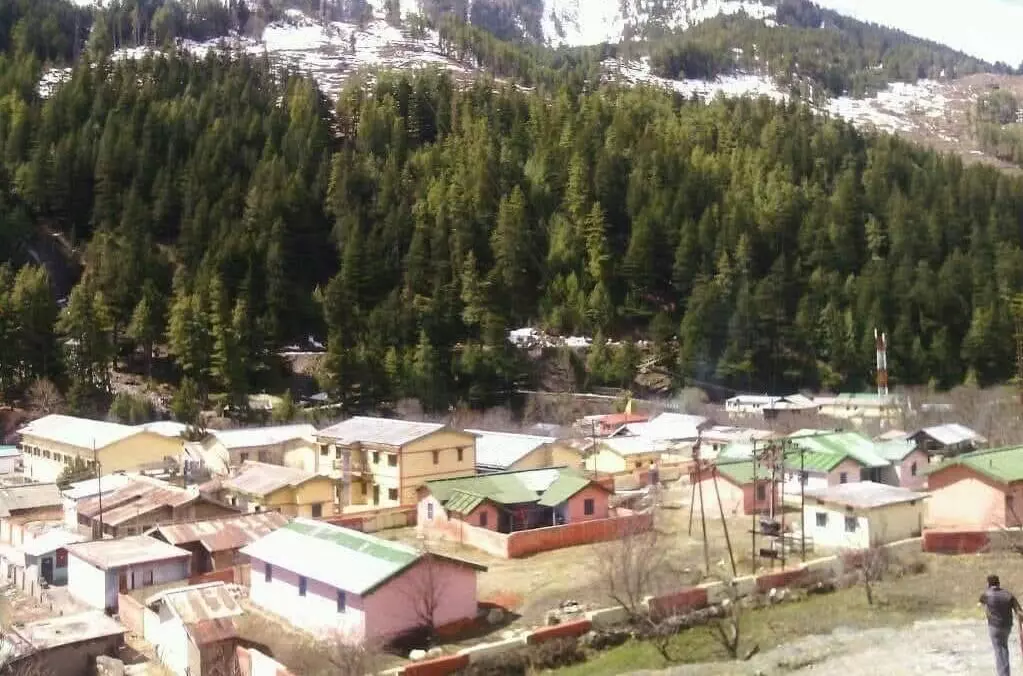Legend Of Fredrick Wison The Pahadi King

Harsil, a small village close to Gangotri in Garhwal of Uttarakhand is a place worth visiting in hot summers. I visited this village twice in 1979 and 1980. This beautiful village on the banks of Bhagirathi was inhabited by Bhootias and Tibetans whose occupation was the wool industry. A dilapidated big log house with paintings and photographs of British settlers hanging in rooms would attract visitors. That house belonged to a man called Fredric Wilson who joined East India Company in 1836. He ran away during the First Anglo-Aghan War in 1838-39 and settled here secretly. He was a keen hunter and naturalist who wrote in sporting magazines under the pen name "Mountaineer".
He hunted and sought rights to kill musk deer which was denied but he was instead given timber harvesting rights from Sudarshan Shah, the Raja of Tehri. He started cutting Deodar logs to flow them in Bhagirati which were being collected at Haridwar for sale in the British era for Railway track sleepers. He became a pioneer in apple plantations and the growing of potatoes in the area. He was virtually worshipped and respected in that region to the extent that he started his currency. He was known as Raja of Harsil. Wilson made money from hunting, selling musk from musk deer and the plumes of monals a local bird. He averaged 1500 monal skins a year over 30 years and other pheasants for the plume trade. He became very wealthy and for a while went by the name of the Raja of Harsil and minted his coinage that could be exchanged for other currency. He had control over the people he helped resettle in the area. The Bhotiya jad people who settled often brought Garhwal girls to work in homes and lived virtually under slavery. This practice was brought to an end by Wilson.
Fredric married two women from nearby Mukhwa village which is still mainly inhabited by the priest clan of Gangotri Temple. First, he married a local woman named Raimata and when she did not have children, he married her aunt, her father Mungetu's sister Gulabi or Gulabi Ruth (originally Sangrami Chand, 1828-1894, from Mukhba). Through Gulabi, he had three children, Nathaniel, Charles, and Henry. His son Nathaniel, locally known as Nathu who took over control in the region took some women at gunpoint to his estate and began to shoot people who approached. This led to a local uprising and ultimately the removal of Nathu and Indri (Henry). He presented a very big bell to a temple in Mukhwa. Their fate is unknown and it has been suggested that they died either in captivity under the Raja of Tehri or drowned in a flash flood. Frederick later moved in to live with the English gentry in Mussoorie, living also at Astley Hall in Dehra Dun, and investing in a hotel named after his son Charles Charleville which is now part of the Lal Bahadur Shastri National Academy of Administration. In April 1880 he was washed off in a flash flood and several newspapers announced his disappearance. A week later, he managed to make his way back home. Wilson died from complications of gout and bronchitis during the night of 21 July 1883. A funeral was held on Monday with a very large turnout. He was buried in the Camel's Back cemetery under a deodar.
A Swiss writer Robert Hutchinson throws light on the life of Fredrick Wison in the biography Fredrick Wison's Gadwal. Fredrick Wison was born in 1817 at Wakefield in Yorkshire. Local Gharwali people would call him Gulson Sahib Pahadi Wilson or Raja Wilson. In 1840 he was the snow-clad peaks of the Himalayas from Lal Tibba Mussoorie. Mesmerised by natural beauty he travelled up to Harsil and settled there. He garnered a contract to cut Devdaar trees from Tehri king deployed local people on the job and became very popular. Tree logs were flown through Bhagirathi river which were later caught at Hardwar and Rishikesh. He would speak Gadhwali very well. He ruled people's hearts with his initiative to inspire them to grow apples and Potatoes to enhance their earnings.
However, Wilson's deforestation was criticized during his lifetime by W.E. Brooks in Stray Feathers, the birding periodical edited by A. O. Hume, and this criticism was responded to by Wilson himself. In the 20th century, the conservationist Sundarlal Bahuguna considered Wilson as the original cause of deforestation in the region. Ruskin Bond wrote a story called Wilson's Bridge based on a bridge across the Bhagirathi that Wilson had built. Bond knew the last descendant, Geoffrey Wilson, son of Charles. Rudyard Kipling stayed in Charleville and likely heard the story of Wilson there and came up with the story of the Man who would be king. Jack Gibson found that his porters were gambling with counters that turned out to be Wilson rupee coins and collected a couple of them in 1938. The large wooden Wilson Cottage at Harsil burned down in 1997. The apple variety that he introduced into the Harsil area continues to be in cultivation.



